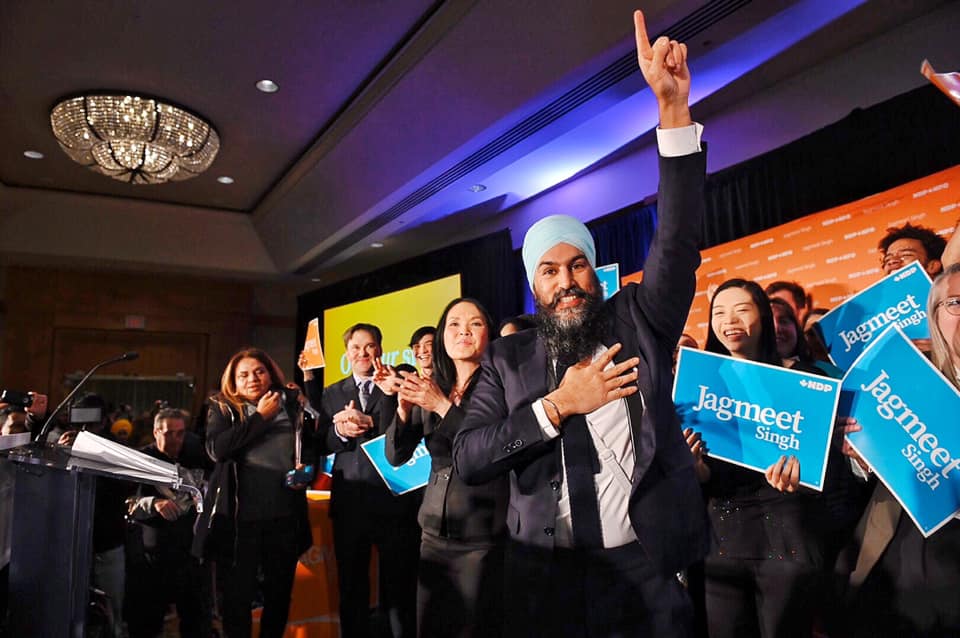Jagmeet Singh becomes the next member of Parliament for Burnaby South; Justin Trudeau will welcome a new Liberal MP for Outremont to his caucus; and the Conservative party of Andrew Scheer proved capable of taking over 50 per cent of the vote in the Ontario seat of York Simcoe.
From the outset, Jagmeet Singh faced questions in his quest for a parliamentary seat in Burnaby South. Going into the byelection, Singh was not well known in the country or the riding. Questions had been raised both about his performance as party leader and his ability to win a seat in B.C. — when his political experience was as a member of the Ontario parliament.
Critics wondered if his campaign would generate enthusiasm among Burnaby New Democrats, and if the party leader could spark the interest in his candidacy needed from party members to elect an outsider to Parliament.
Results from last night’s byelection have put those fears to rest. Singh captured a respectable 39 per cent of the vote (the same percentage as the total Liberal vote in the 2015 election) in a very competitive riding, finishing comfortably ahead of Liberal Richard Lee who was second with 26 per cent.
The NDP leader walked the riding, knocking on doors, and talking affordable housing, education, and the environmental consequences of expanding the Trans Mountain pipeline. His warmth and personality connected him to voters.
While Burnaby is NDP-friendly, in 2015, Kennedy Stewart, now the mayor of Vancouver, won the riding for the NDP by only just over 500 votes.
In winning, Singh benefited from the advantage citizens are traditionally willing to give a leader seeking to enter Parliament in a byelection.
The Green Party offered Singh a “leader’s courtesy” and did not put up a candidate against Singh.
The Conservative candidate, lawyer Jay Shin, was endorsed by the Vancouver Sun, and managed a third-place finish, with 23 per cent.
The Outremont riding, won for the NDP by Tom Mulcair in a 2007 byelection and held by him over three subsequent general elections, returned to the Liberal fold. Montreal lawyer Rachel Bendayan, who specializes in international arbitration and transnational litigation (and works in the same firm as Brian Mulroney), handily defeated NDP candidate Julia Sanchez. The Liberal candidate registered 40 per cent to 26 per cent for the NDP standard-bearer, an international-development specialist who was born in Latin America but grew up in the Gaspé region of Quebec.
Voter turnout is generally much lower in a byelection than a general election. The turnout in Outremont was certainly affected by a major storm. The total vote for all candidates (15,055) was close to the level (14,348) reached by Tom Mulcair in his 2008 general election victory.
In the York-Simcoe byelection to replace veteran Conservative Peter Van Loan, Conservative Scot Davidson, owner of the Bonnie Boats marina, garnered 54 per cent of votes cast to win over Liberal Shaun Tanaka, who took second place with 29 per cent. New Democrat Jessa McLean ran highlighting protection of the environment, reducing dependence on fossil fuels, and touting the NDP pledge to bring in pharmacare, but only received 7.5 per cent support.
The three byelections were the first attempt by the People’s Party of Canada (PPC) to elect candidates. Maxime Bernier, who justifiably believes that he was cheated out of winning the leadership of the Conservative Party of Canada, decided to found the PPC. His party program is right-wing populist and based on his Conservative leadership campaign platform.
In what sends a message to leader Andrew Scheer and his Conservatives, the Burnaby South PPC candidate Laura-Lynn Thompson received 10.6 cent of the vote.
PPC supporters disrupted all-candidate debates in Burnaby South with shouts, bullying, and calls to restrict immigration. Thomson, a former Christian television personality, showed that with a strong, visible local candidate, the PPC could take votes away from the Conservatives. They could become a presence in some ridings that first elected the former Reform Party.
With Justin Trudeau surrounded by controversy, pundits wondered: would Green Party candidates attract disaffected Liberals? In Outremont, the party led by Elizabeth May attracted significant support; at 12.5 per cent Green Party candidate Daniel Green finished just ahead of the Bloc Québécois at 11 per cent.
As the first visible minority leader of a significant Canadian political party, Jagmeet Singh made history Monday night. Commenting on his election to Parliament, he announced his intention to connect with Canadians as never before.
The NDP needs a fresh start. A lot will be asked of the party leader, his advisers, and eventual campaign team.
It was a night to celebrate for all three parties: but the three byelections were only a preliminary warm-up for the general election this coming October 21.
Duncan Cameron is president emeritus of rabble.ca and writes a weekly column on politics and current affairs.
Photo: Jagmeet Singh/Facebook
Help make rabble sustainable. Please consider supporting our work with a monthly donation. Support rabble.ca today for as little as $1 per month!




